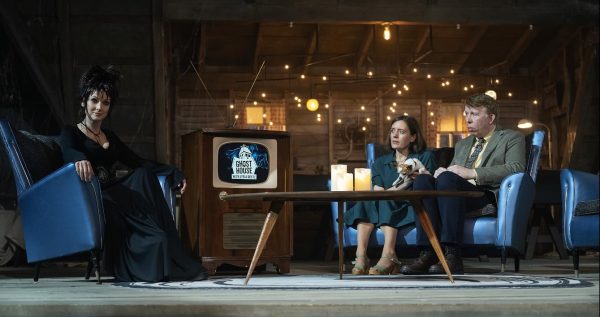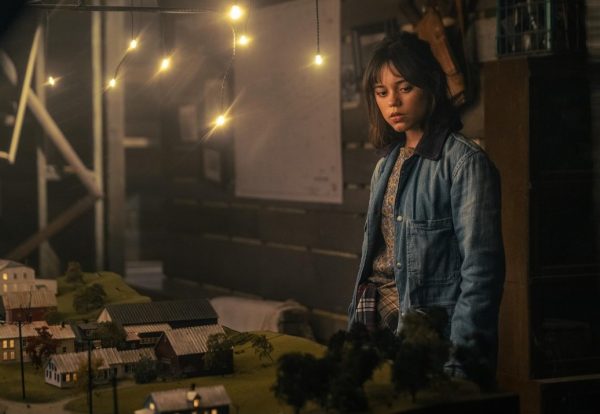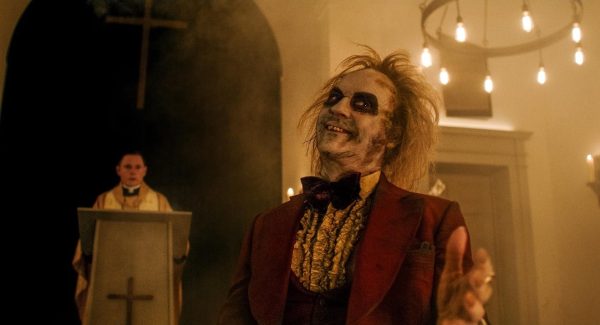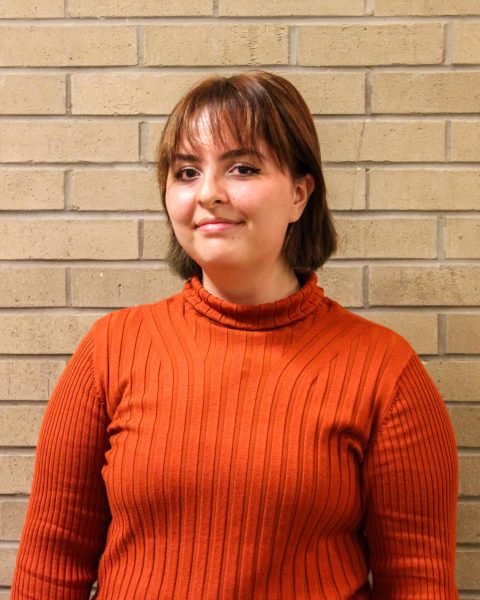This review contains spoilers for “Beetlejuice Beetlejuice.”
As that time of year approaches, when the entrance to Walmart is overrun with Halloween decorations, a beloved franchise has made its long-awaited return. The 2024 “Beetlejuice” sequel, “Beetlejuice Beetlejuice,” reunites part of the 1988 cast alongside Hollywood A-listers for an underwhelming return.
“Beetlejuice Beetlejuice,” released Sept. 6, is a sequel to the 1988 classic “Beetlejuice.” The sequel sees the Deetz family returning to Winter River for the funeral of Charles Deetz. There they must once again confront Betelgeuse all while his soul-sucking ex-wife returns to hunt him down.
The movie opens with Winona Ryder’s weak performance as Lydia Deetz, now turned successful television host and psychic.

Early on, I assumed Ryder’s uncomfortable performance was her intentionally using it to show the audience that Lydia is unhappy with her current life. Being an awkward and introverted character, it would be natural for her to deliver lines in a stilted way, especially when performing in front of a live audience.
But in making her character uncomfortable all the time, intentional or not, its frequency strips this behavior of its meaning. It becomes her default setting.
She stops being uncomfortable because she’s starting to realize her soon-to-be fiancé Rory (Justin Theroux) is taking advantage of her, and she can’t find the right words to say to her estranged daughter Astrid Deetz (Jenna Ortega). It’s no longer because of her father’s unexpected death or Betelgeuse’s (Michael Keaton) return. She stops being a well-intentioned mother, struggling to do what is best for herself and her family, and becomes a caricature.
Each time Ryder performed, I felt my willing suspension of disbelief being revoked, but she wasn’t the only one who caused this.
“Beetlejuice Beetlejuice” seems to conflate shock with humor. Peppered throughout the movie are scenes that appear to be attempts at humor, which forced me to look over at my friend to find we were both mouthing, ‘WTF.’ The sequel does not strike the same balance as the original.
These scenes, which I would refer to as plot distractions, were part of a greater pattern of issues with the script.
Much like Rory, Betelegeuse’s ex-wife Delores (Monica Bellucci) is neither a complete enough nor interesting enough character to warrant a major storyline. She is just another instance of this film prioritizing famous actors over interesting characters.
Although her title as Betelgeuse’s ex-wife lends her importance, her character has none independent of that role. She would have been more interesting if there was more to her than a Terminator-like insistence on killing everything on her path to Betelgeuse.
Another would be the frequent appearances of Willem Dafoe as Wolf Jackson, a sort of detective in the Neitherworld, so he can continue making the same jokes about being an actor and having an assistant. For as frequently as he appears, you would think Dafoe’s character would have accomplished more.

Another character with untapped potential is Astrid. Astrid is nerdy, independent and clever. She’s an outcast like her mother but takes after her climate-activist father’s interests.
It is understandable why, after enduring bullying at school, she would fall so quickly for Jeremy Frazier (Arthur Conti) after only a few days of knowing him. In him, she finds the acceptance she has been craving.
It makes sense in theory, but in the movie, it feels so fast because the intellectual side of her is shown more than the wounded one. Also, because the audience is kept busy chasing other plots.
Astrid never truly seems able to understand her own motivations because they don’t give her a chance to feel any emotions deeper than frustration, annoyance or anger.
She could have been more than a generic angsty teenager in a coming-of-age movie who hops on her bicycle and rides away through her idyllic small-town whenever she is upset.
For instance, we could have had a narrative about her feeling like an outcast in her eccentric family if they had focused on her relationship with her grandfather. Early on, she points out that he was the most normal person she had. But the most we get out of his character, who is important enough to bring everyone back together, is a bumbling trip through the afterlife. I’m still not over how little they cared about his death or the terrible animation they used to depict it.
The movie even attempts to shortcut character development by having Astrid forgive her mother at the end, but it’s not an adequate replacement for it. I’m sure seeing her father again and knowing that he’s with her as much as he can be, eases her grief. But at the end of the movie, she’s still a girl who misses him, now with more trauma.

This sequel was unable to replicate a large part of what made “Beetlejuice” magical because it forgot there was more to its world than pinstripes, bright colors and gore.
This largely came from the Maitlands, a kind and good-natured couple who wanted children but died before they could have them. When Charles and Delia Deetz (Catharine O’Hara), eccentric parents who are so concerned with their own interests that they fail to meet the emotional needs of their daughter, come into their lives, the plot begins. After they survive the terrors endured at the hands of Betelgeuse and Otho, they form their own found family. The movie ends with the main characters having grown as people or accomplishing their goals. It gives their suffering a purpose.
Contrast this with the sequel, where arguably the only character growth is done by Astrid, and even then, not to her full potential, and you can see why this movie failed to connect with me.
By the end of the movie, Lydia still does not stand up for herself, Charles and Delia die as self-absorbed as ever, and Betelgeuse continues to be awful.
Although the movie theoretically ended on a happy note, since very little changed positively from where the movie began, it’s difficult for the viewer to trust that things will continue to work out for the characters.
Overall, my issues with the movie outweighed what I found charming.
The nostalgic opening credits brought me back to being a kid picking out movies to rent at Family Video. The callbacks, Danny Devito, O’Hara’s Moira Rose-esque performance as Delia, the sets, the scenic landscape of Winter River, references to famous artworks and artists, the soundtrack and the world of “Beetlejuice” all brought me joy.
Ultimately, though, “Beetlejuice Beetlejuice” could not make up for committing the greatest sin a comedy film can do: it didn’t make the audience laugh.




